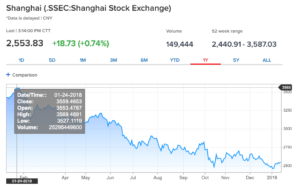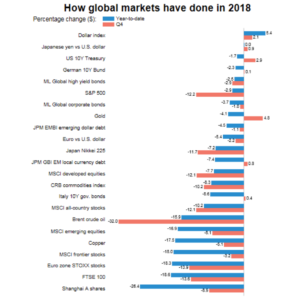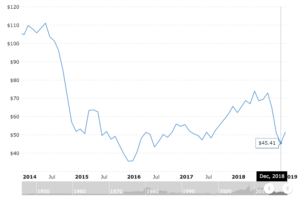Dear PGM Capital Blog reader,
In this weekend blog article, -the first one for this year – we want to look back on the year 2018, which will go into history as the worst year for the Global Capital Markets since 2008, for which the DOW Jones Industrial will hold the record for the worst December since 1931.
INTRODUCTION:
Equities have been hammered in 2018 by tighter monetary policy, from the US Federal Reserve (the Fed) and also the European Central Bank, which halted its quantitative easing stimulus policy in December.
The Bank of England, meanwhile, hiked British interest rates in August for the second time since the financial crisis to help tame inflation, despite worries that Brexit could wreak havoc on the economy.
Sentiment was also dented by US President Donald Trump’s “America First” trade policy, which has sparked a damaging trade war with China and others.
Investors also ran for cover as the uncertain nature of Britain’s looming exit from the European Union in March 2019 casts a long shadow.
OIL PRICES:
Oil prices posted their first annual drop in three years as fears of a slowing global economy and emerging supply glut outweighed impending production cuts from OPEC nations.
Both oil benchmarks – WTI as well as BRENT – went down with more than a third in Q4-2018, the steepest decline since the fourth quarter of 2014. For the year, WTI. crude has lost almost 25 percent, while BRENT is off by nearly 20 percent.
CHINESE MARKETS:
The year 2018 has not been a great one for Chinese stocks. In fact, it’s been the worst in a decade.
As can be seen from below chart, the Shanghai composite, the mainland’s major share average, ended the trading year at 2,493.90 — that was approximately 24.6 percent lower than its final close of 2017.
All 10 sectors of the index were down significantly in the year, with information technology being the worst performer as it fell 34 percent, according to Chinese financial services firm Wind Information. Even the best performing sector, utilities, dropped 11 percent.
As shares on the mainland were pummeled, Hong Kong stocks performed a bit better. The Hang Seng index notched a decline of only 13.61 percent for 2018.
PGM CAPITAL’s ANALYSIS & COMMENTS:
Global Markets:
After 10 years of low interest rates and quantitative easing, we have to understand how some of this leverage in the market can unwind.
A fair bit of the year’s pain has stemmed from swift move up in U.S. interest rates and a pumped-up dollar .DXY, which has had its best year in three years.
As a result, the Euro (EUR), pound (GBP), Canadian (CAD) and Aussie dollars (AUD) and Swedish crown (SEK) have all lost between 5 and 10 percent and though the Japanese yen (JPY) comes out largely unscathed. Unfortunately, emerging markets certainly haven’t.
Argentina’s peso (ARS) and Turkey’s lira (TRY) have slumped 50 and 30 percent, while India’s rupee (IDR), South Africa’s rand (ZAR), Brazil’s real (BRL) and Russia’s rouble (RUB) are all down between 10 to 15 percent.
We are glad to see the back of 2018. Nearly US$7 trillion has been wiped off world stocks, emerging markets have been trampled flat by a charging dollar and even gold and U.S. government bonds have lost money
Below chart shows the performance of major Global markets and securities performed in the Q4-2018 and up to December 20, 2018.
OIL Prices:
Below chart shows the 5-year performance of the oil prices in which we can see a wild 35 percent plunge in oil prices since September of last year.
Chines Markets:
Beijing’s ongoing trade war with Washington dominated headlines for much of the year, with the Chinese markets taking hits throughout as authorities undertook a string of measures, such as cutting the amount of reserves held by banks. This had with limited success in calming traders.
Looking ahead to 2019, we believe that the two economic powerhouses would likely strike a trade deal, which will be in favor of the Chinese Markets, for which we believe that securities of Chinese Technology Companies will profit the most.
Last but not least, before taking any investment decision, always take your investment horizon and risk tolerance into consideration. Keep in mind that share prices do not move in a straight line. A Past Performance Is Not Indicative Of Future Results. Technology stocks and stocks of emerging markets, experience a higher volatility than the ones of developed market big-caps.
Yours sincerely,
Eric Panneflek





